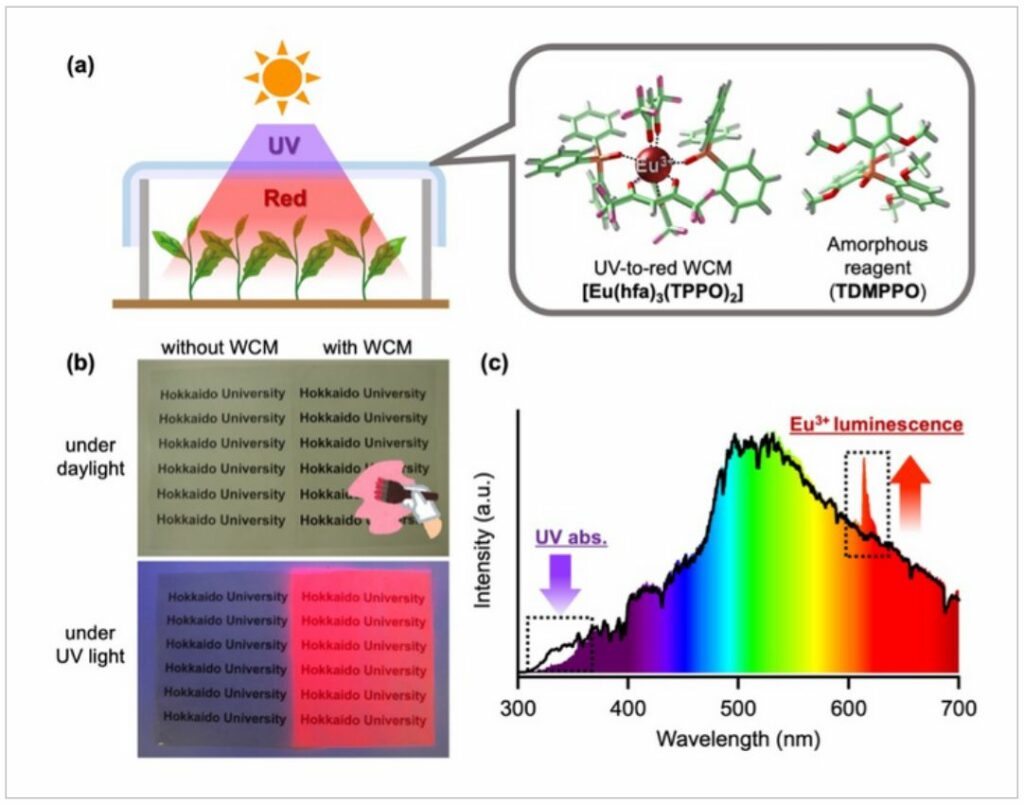Plastic sheets coated with a Eu3+ film that transforms UV light to red light were able to promote the growth of vegetative plants and trees.
The Institute for Chemical Reaction Design and Discovery (WPI-ICReDD) and the Engineering and Agriculture departments of Hokkaido University collaborated to create the thin-film coating, which is based on europium and has been shown to speed up the growth of both trees and vegetative plants.
This technology has the ability to alleviate difficulties with the world’s food supply while accelerating plant growth.
Plants use a process called photosynthesis to transform visible light into energy. Sunlight emits ultraviolet (UV) radiation in addition to visible light.
In this study, scientists used a wavelength-converting material (WCM) that can change UV radiation into red light to provide plants more visible light for photosynthesis.
Researchers created a thin-film coating that can be applied to plastic sheets that are currently on the market and a WCM based on a europium complex.
Researchers demonstrated that the film does not block any of the sun’s helpful visible light and that it converts UV light to red light.

The film was then tested by comparing how plants grew on sheets with and without the WCM coating. Both Swiss chard, a herbaceous plant, and Japanese larch trees were tested.
When Swiss chard was exposed to the WCM films in the summer, when the days are long and the sun’s irradiation is powerful, no discernible difference was found.
However, Swiss chard plants grown with the WCM films demonstrated 1.2 times better plant height and 1.4 times larger biomass after 63 days in the winter, when the days are shorter and sunlight is weaker.
This rapid growth was attributed by researchers to the WCM films’ increased supply of red light.
Japanese larch tree trials also shown rapid growth. In the first four months of development, seedlings exhibited a greater relative growth rate, which led to a 1.2-fold increase in stem diameter and a 1.4-fold increase in total biomass compared to trees grown without the WCM coating.
Importantly, this made it possible for the seedlings to grow to the appropriate size for planting in Hokkaido’s forests in just one year. According to the team, WCM films could reduce seedling growth time from two years to one year, resulting in more economically sound plant output.
Because it doesn’t need electricity to function, this technology has the potential to address difficulties with food security in colder locations. The adaptability of the technology is particularly appealing to researchers.
“By using a coating of wavelength changing material, we were able to successfully create a transparent film and demonstrate its ability to accelerate plant growth,” adds lead author Sunao Shoji. “By rationally designing the light-emitting ion, we can freely control the color of emitted light to be other colors like green or yellow, so we expect to be able to create wavelength converting films that are optimized for different plant types. This opens a large avenue of future development for next generation agricultural and forestry engineering.”
Source:10.1038/s41598-022-21427-6
Image Credit: Sunao Shoji et al. Scientific Reports. October 26, 2022
You were reading: Newly Developed Eu3+ Film Accelerates Growth of Vegetable Plants And Trees